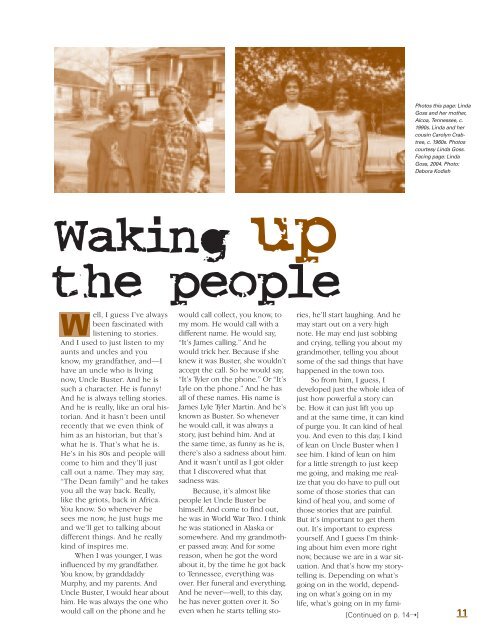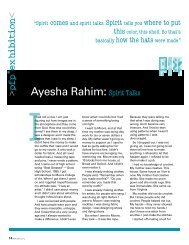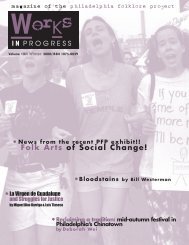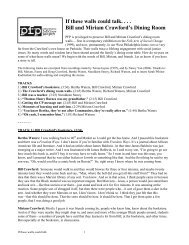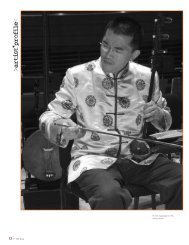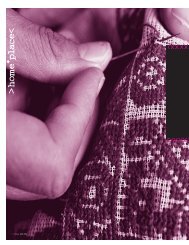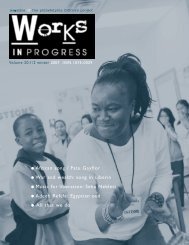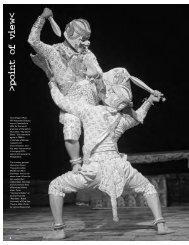View PDF - Philadelphia Folklore Project
View PDF - Philadelphia Folklore Project
View PDF - Philadelphia Folklore Project
- No tags were found...
You also want an ePaper? Increase the reach of your titles
YUMPU automatically turns print PDFs into web optimized ePapers that Google loves.
Photos this page: LindaGoss and her mother,Alcoa, Tennessee, c.1990s. Linda and hercousin Carolyn Crabtree,c. 1960s. Photoscourtesy Linda Goss.Facing page: LindaGoss, 2004. Photo:Debora KodishWaking upthe peopleWell, I guess I’ve alwaysbeen fascinated withlistening to stories.And I used to just listen to myaunts and uncles and youknow, my grandfather, and—Ihave an uncle who is livingnow, Uncle Buster. And he issuch a character. He is funny!And he is always telling stories.And he is really, like an oral historian.And it hasn’t been untilrecently that we even think ofhim as an historian, but that’swhat he is. That’s what he is.He’s in his 80s and people willcome to him and they’ll justcall out a name. They may say,“The Dean family” and he takesyou all the way back. Really,like the griots, back in Africa.You know. So whenever hesees me now, he just hugs meand we’ll get to talking aboutdifferent things. And he reallykind of inspires me.When I was younger, I wasinfluenced by my grandfather.You know, by granddaddyMurphy, and my parents. AndUncle Buster, I would hear abouthim. He was always the one whowould call on the phone and hewould call collect, you know, tomy mom. He would call with adifferent name. He would say,“It’s James calling.” And hewould trick her. Because if sheknew it was Buster, she wouldn’taccept the call. So he would say,“It’s Tyler on the phone.” Or “It’sLyle on the phone.” And he hasall of these names. His name isJames Lyle Tyler Martin. And he’sknown as Buster. So wheneverhe would call, it was always astory, just behind him. And atthe same time, as funny as he is,there’s also a sadness about him.And it wasn’t until as I got olderthat I discovered what thatsadness was.Because, it’s almost likepeople let Uncle Buster behimself. And come to find out,he was in World War Two. I thinkhe was stationed in Alaska orsomewhere. And my grandmotherpassed away. And for somereason, when he got the wordabout it, by the time he got backto Tennessee, everything wasover. Her funeral and everything.And he never—well, to this day,he has never gotten over it. Soeven when he starts telling stories,he’ll start laughing. And hemay start out on a very highnote. He may end just sobbingand crying, telling you about mygrandmother, telling you aboutsome of the sad things that havehappened in the town too.So from him, I guess, Ideveloped just the whole idea ofjust how powerful a story canbe. How it can just lift you upand at the same time, it can kindof purge you. It can kind of healyou. And even to this day, I kindof lean on Uncle Buster when Isee him. I kind of lean on himfor a little strength to just keepme going, and making me realizethat you do have to pull outsome of those stories that cankind of heal you, and some ofthose stories that are painful.But it’s important to get themout. It’s important to expressyourself. And I guess I’m thinkingabout him even more rightnow, because we are in a war situation.And that’s how my storytellingis. Depending on what’sgoing on in the world, dependingon what’s going on in mylife, what’s going on in my fami-[Continued on p. 14➝]11


